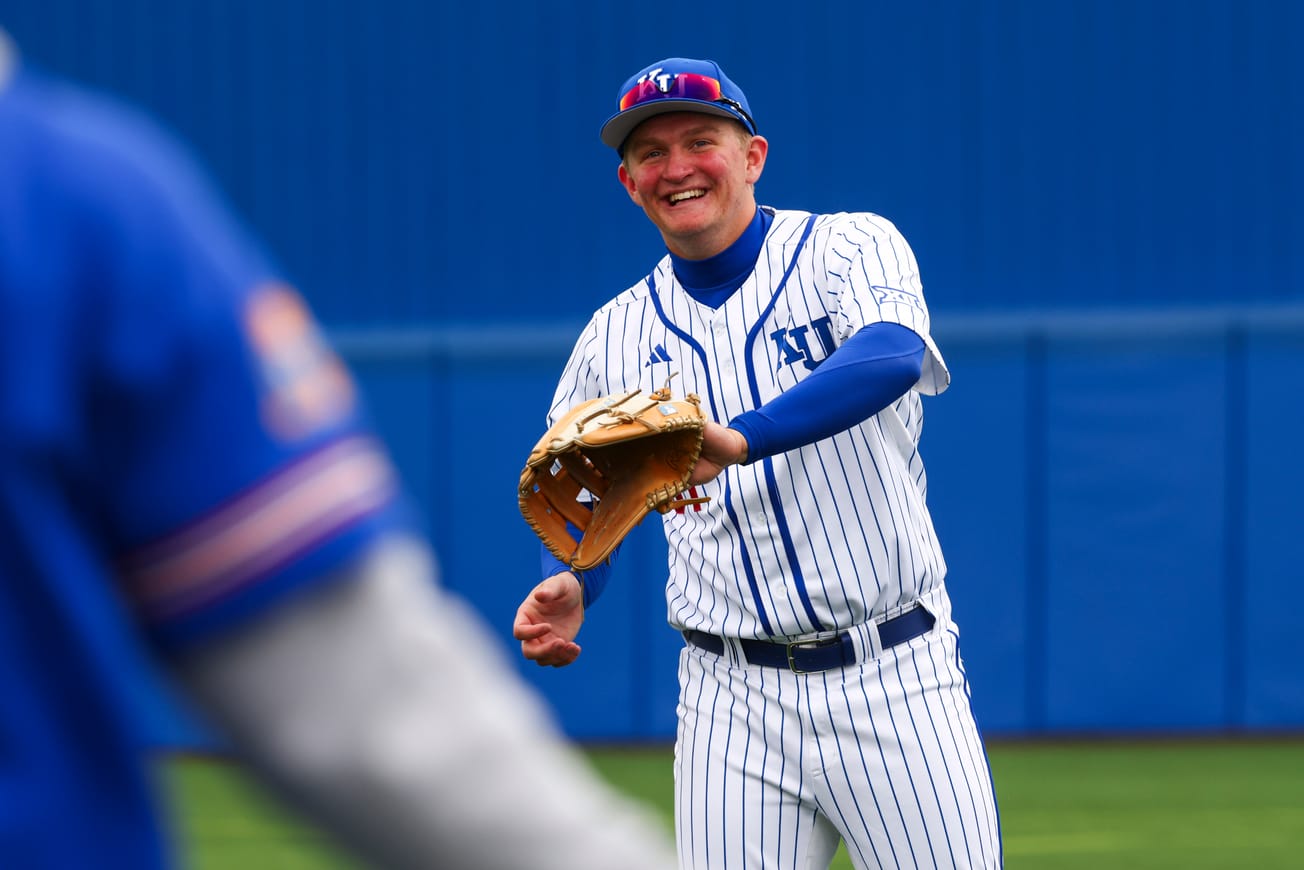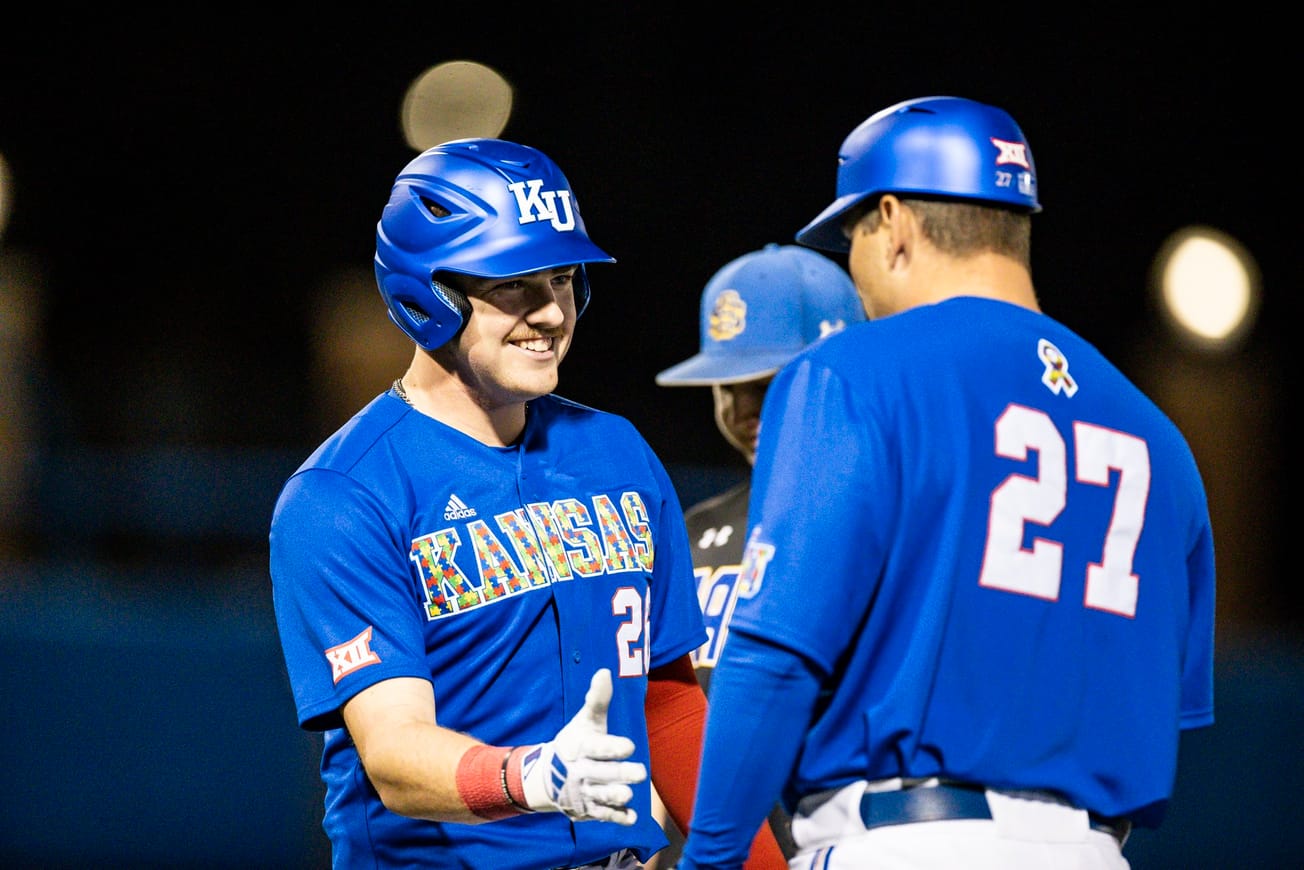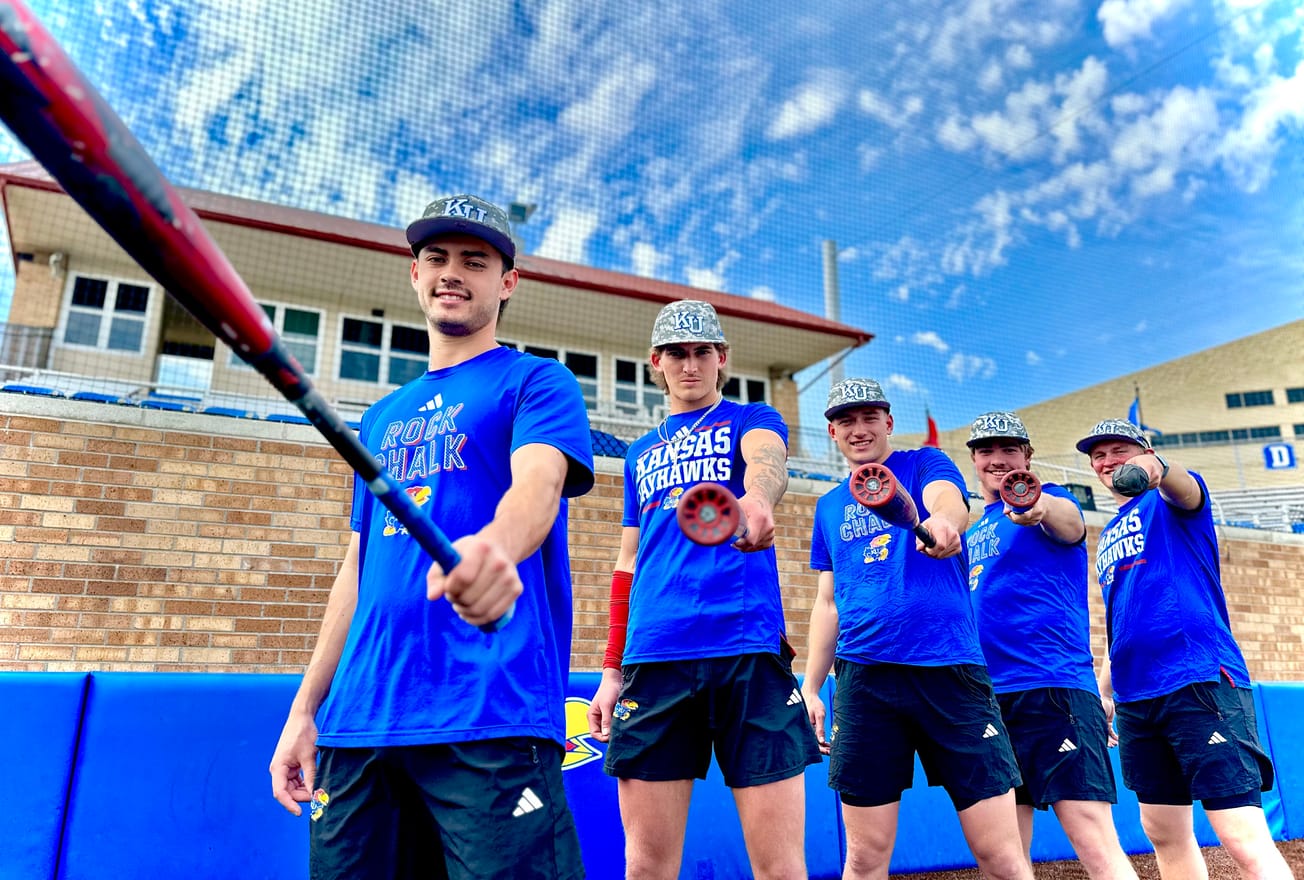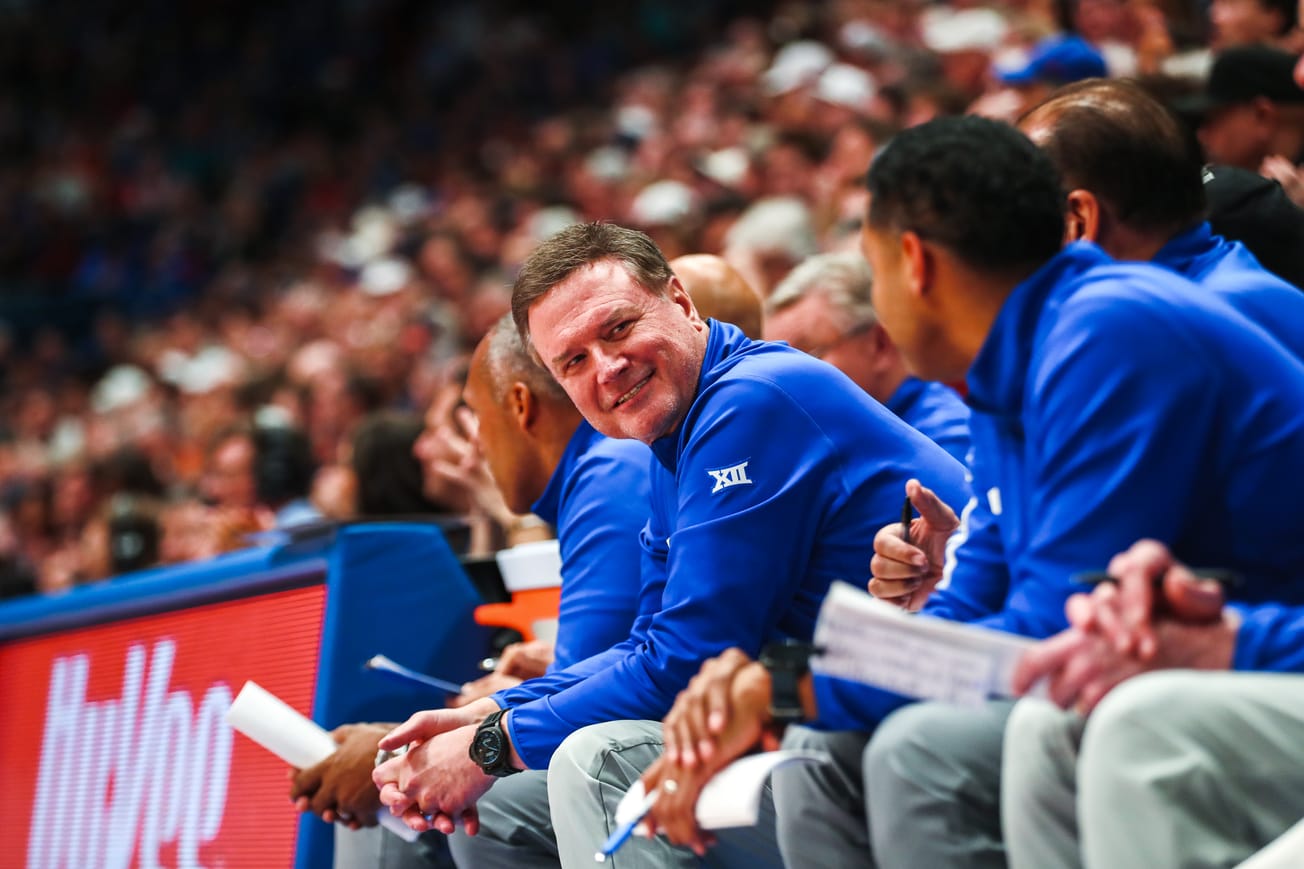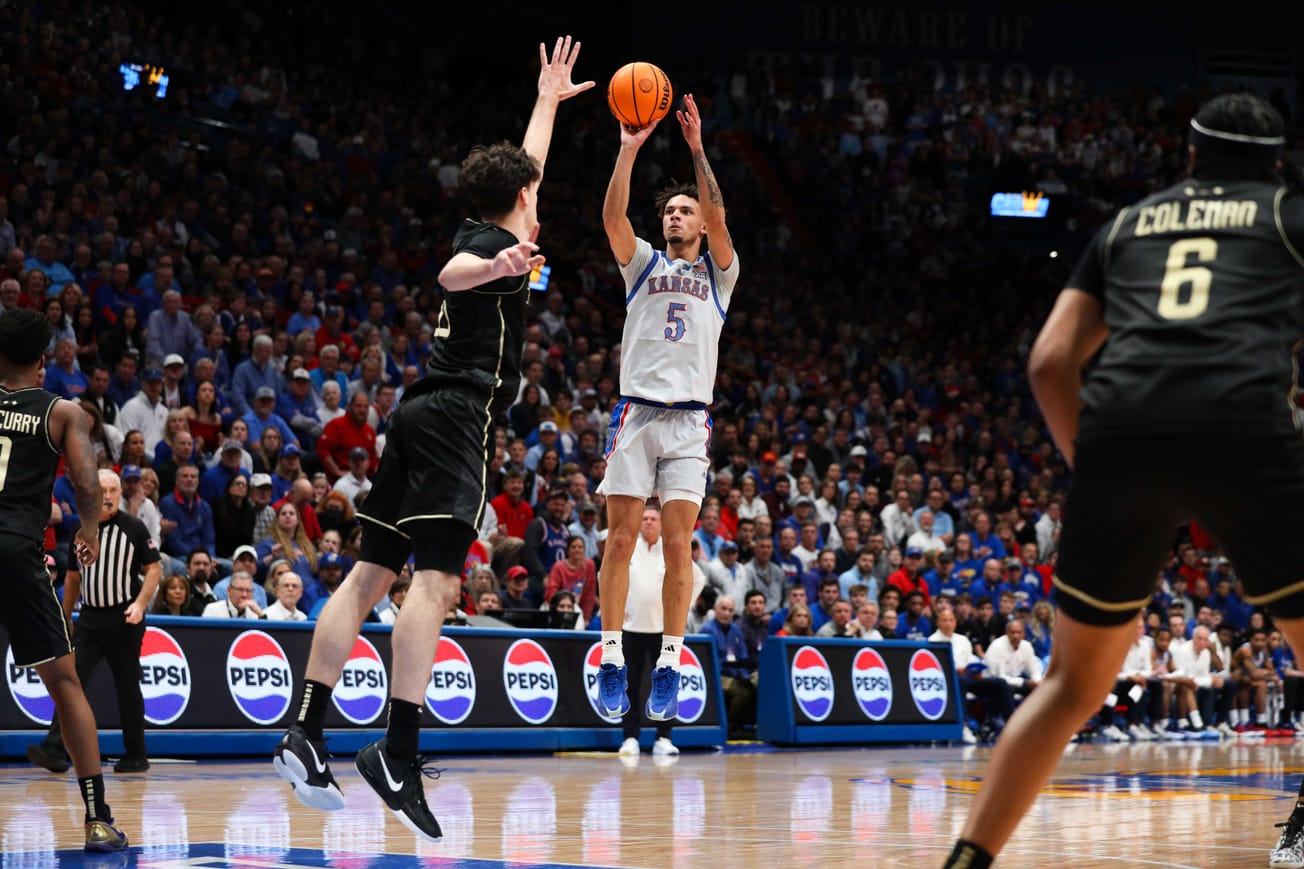When Kansas senior Jackson Hauge barreled up a ball for a 3-run home run to give Kansas a wild, come-from-behind win over Kansas State on Friday night at Hoglund Ballpark, the 360-foot trot that followed featured a little taste of everything Hauge has been through during the past 18 months.
Joy. Pride. Euphoria. Tenacity. Fight. And more. All of it showed on his face as he rounded the bases after his most recent no-doubt moon shot.

There’s plenty to like about the way Hauge (pronounced howg-ee) is swinging the bat this season.
He’s a big, strong, imposing figure. He swings with power and tempo and tries to drive the ball as hard and far as he can with just about every swing.
And the numbers show he’s doing a damn good job of it, too. He ranks tied for third in the nation with 17 home runs (one off the lead) and sits comfortably atop the Big 12 charts in home runs and RBIs (60) through 41 games.
But if you knew what Hauge had to go through to get to this point, you’d be amazed and understand that each at-bat is a feat unto itself, regardless of how hard or far he hits the ball.
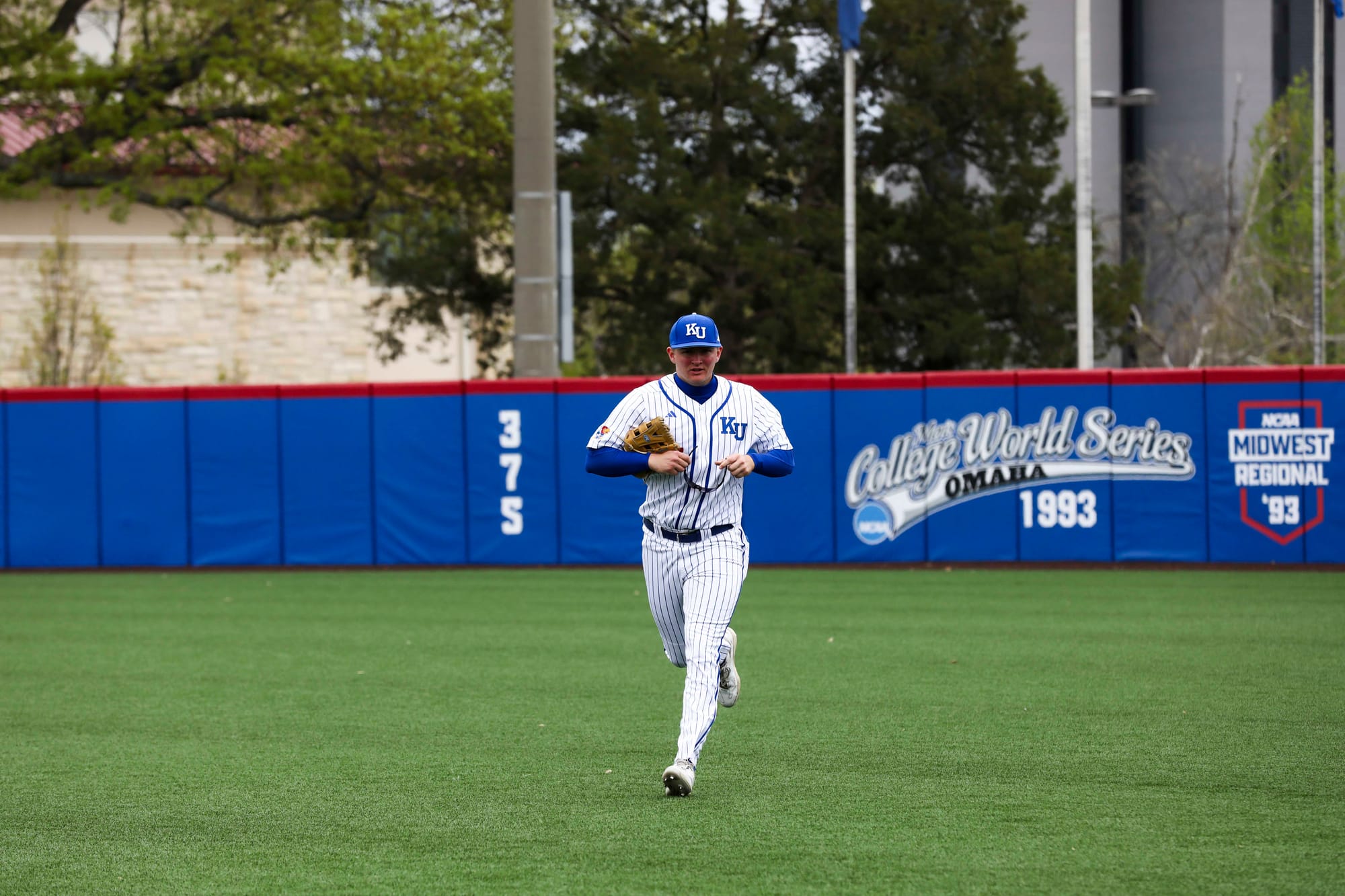
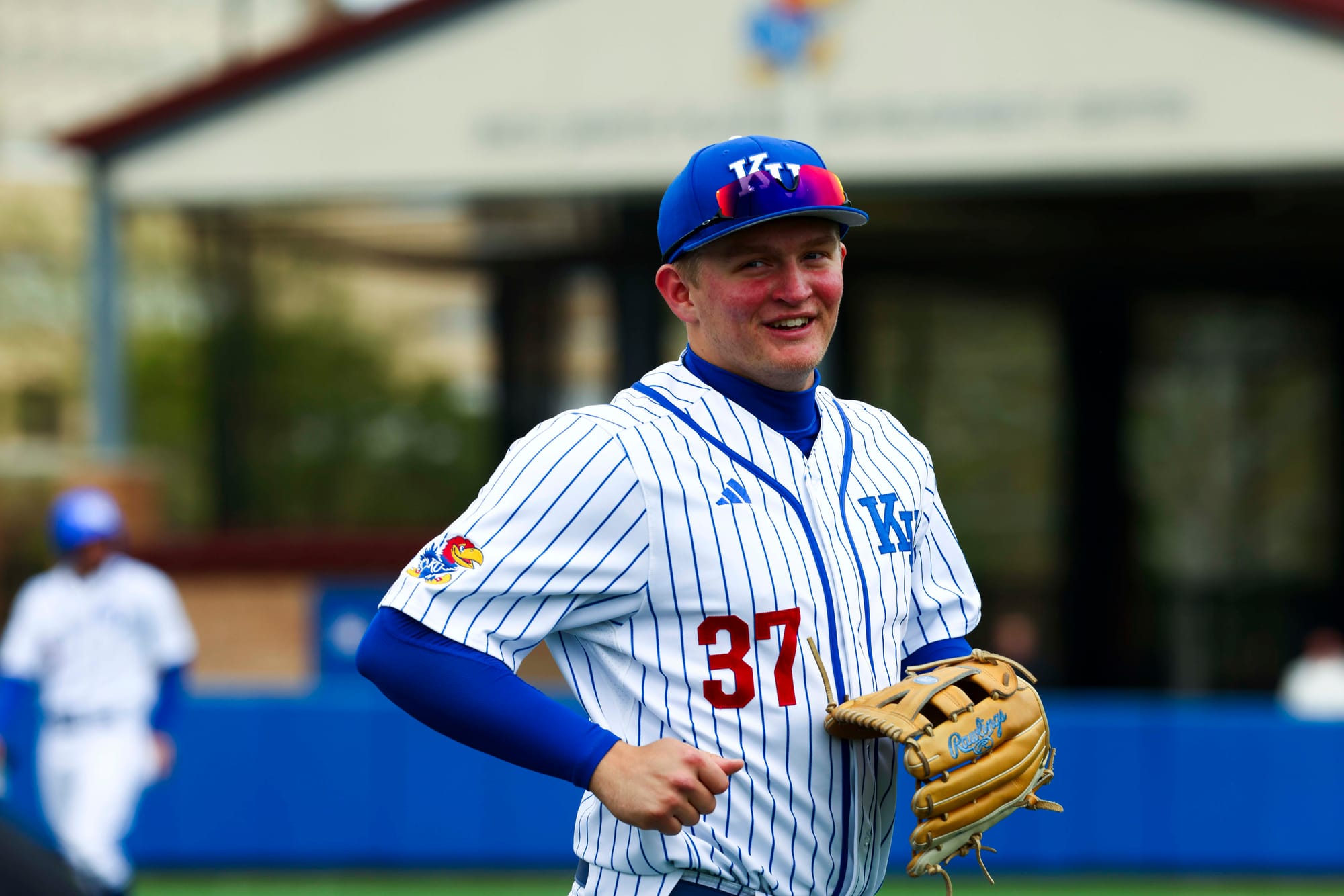
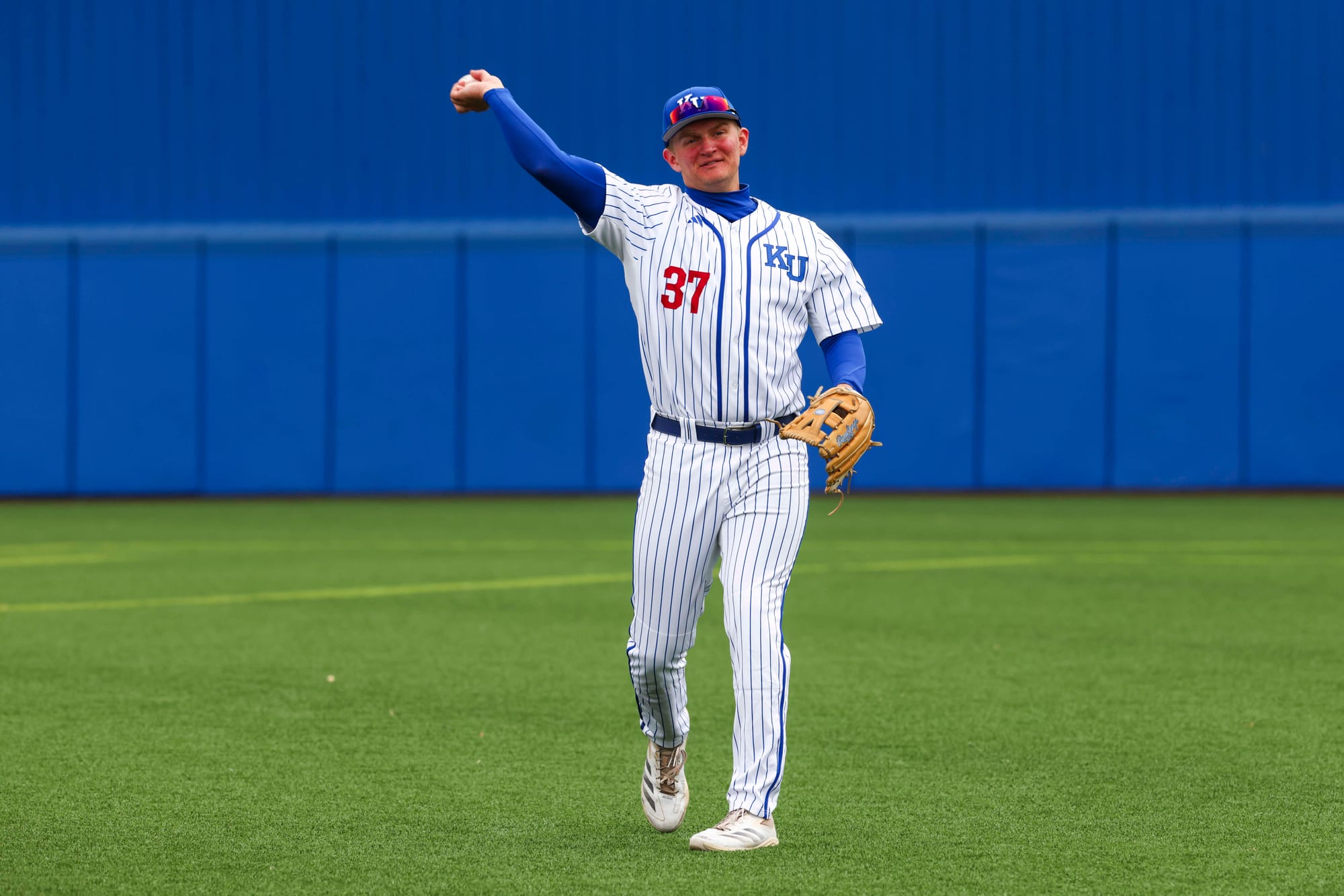
Senior Jackson Hauge shown here between innings during a recent KU home game at Hoglund Ballpark. [Chance Parker photos]
The injury and its mental toll
Although his life began in his beloved home state of Minnesota, cheering for the Twins, hanging out with friends and doing all the other things that kids from the northern part of the country do, the moment that brought Hauge to where and who he is today arrived in October of 2023.
It started innocently enough, like hundreds of other days of his life up to that point. He put on his uniform and hat, laced up his cleats and jogged out to the field at MSU to play first base in a fall ball game.
That day, though, there was something looming that he could’ve never expected.
A collision at first base between Hauge in the field and the batter trucking down the line rocked him like he had never been rocked before. And it triggered a series of events — and even some non-events — that changed the direction of his life for the next couple of years and, in many ways, for good.
He remembers it well enough to know it happened, and even can recall, with vivid clarity, the moment of impact.
“I remember getting hit and I felt like I saw the back of my head,” he told R1S1 Sports during a recent sit-down interview in the KU dugout.
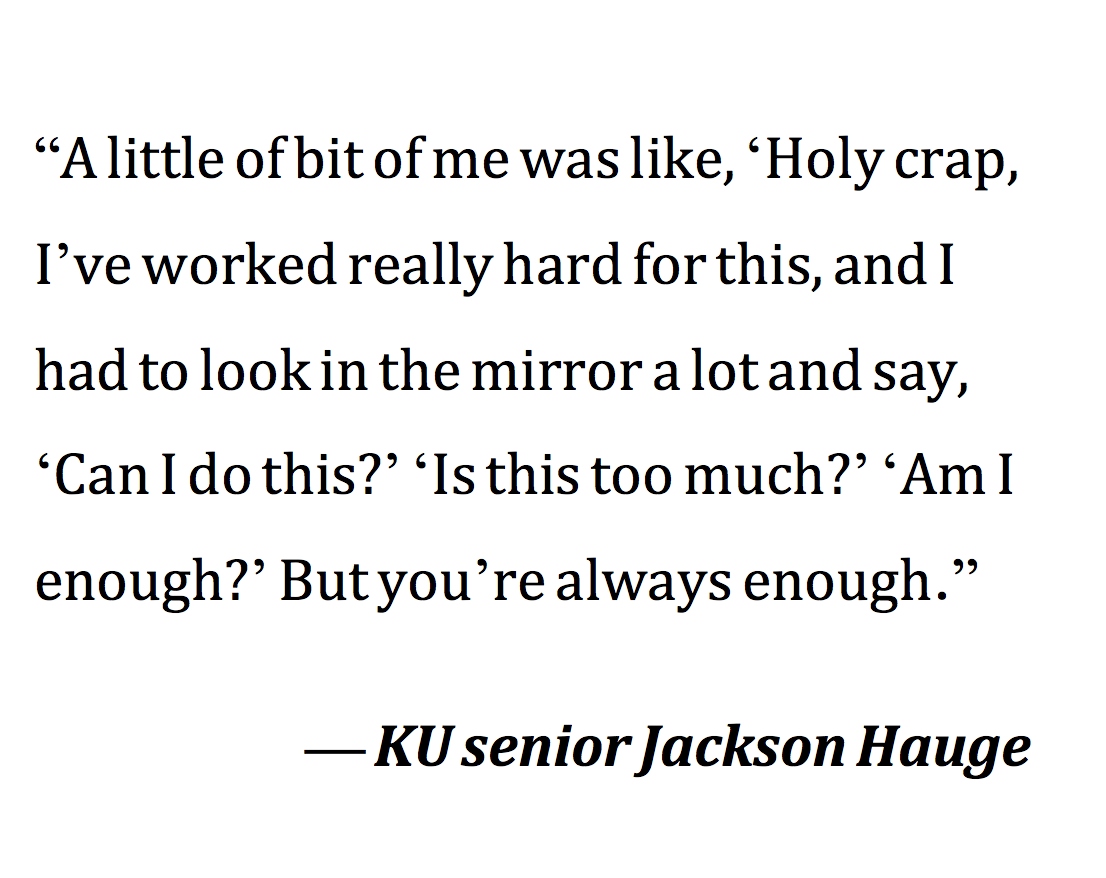
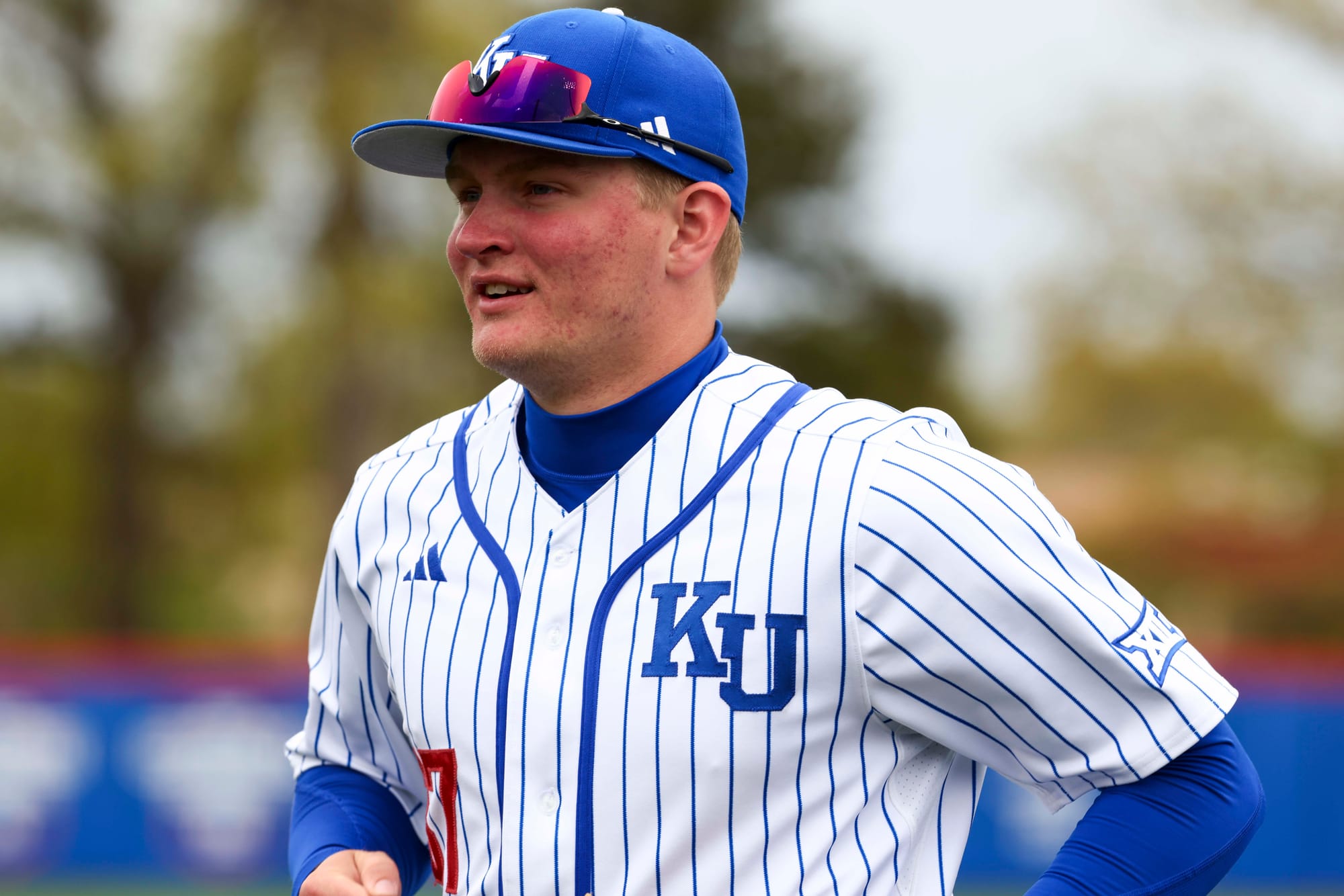
At the time, Hauge was five credits shy of graduating from Minnesota State Mankato and nearing a decision to enter the transfer portal in November, which he still did, but not without some trepidation.
As soon as he went in, the Kansas coaching staff called.
Some of Hauge’s former teammates had played for third-year Jayhawks' skipper Dan Fitzgerald at KU, and they always talked highly of their experiences in Lawrence.
When the coaching staff offered Hauge a scholarship, it didn’t take him long to accept.
His plan was to join the Jayhawks between semesters during the 2023-24 school year. That would’ve brought him to Lawrence in January of 2024 and had him in a KU uniform for his final season a few months later.
But during Christmas break in 2023 — after another strong season at Mankato that spring and a stellar summer with the St. Cloud Rox — Hauge began having severe memory problems.
He had been around sports long enough to know that he was never going to be completely the same after the serious concussion. He'd had his bell rung before, too. While athletes overcome head injuries all the time, Hauge always believed that they come out of them with a new baseline that’s a little lower than what their normal 100% once was.
After the memory issues surfaced, Hauge visited with doctors and explained what was going on.
“I had all the symptoms you could list,” he said, noting that the initials CTE began to enter his thoughts.
He was calmed somewhat by knowing that CTE — chronic traumatic encephalopathy, a progressive brain injury that results from repeated head trauma — had always been more common in football than baseball. But based on the symptoms and uncertainty surrounding his current condition, he wasn’t ruling anything out.
Not only was there physical pain that lingered, but Hauge also had to manage doctor’s orders that kept him from being able to work out the way he used to.
From December of 2023 through February of 2024, he was told not to elevate his heart rate above 112 beats per minute, a mark he reminds himself of to this day with the number “112” written on the inside of his first baseman’s mitt, next to the words “God is good.”
On most days during that period, he also didn’t always feel quite up to getting into the gym or cage to go through the regular routine that got him to that point in his baseball career.
Sensitivity to light, sound and movement all created a serious challenge for him to do what he had always done best.
“They really found out my eyes were the problem,” Hauge recalled of his diagnosis in December of 2023. “I was having double vision, all day every day, and I couldn't see straight a foot in front of me.”
As if hitting a baseball wasn’t already difficult enough, how was he supposed to have any success with these things plaguing him?
“I worry about all my guys, mostly from the standpoint of the fact that the majority of baseball players don’t get to put the game down the way they want to,” longtime Hauge coach Kevin Kirkwold told R1S1 Sports. “So, that question of, ‘Is this over?’ was always the back of my mind, and I’m sure his, too.”
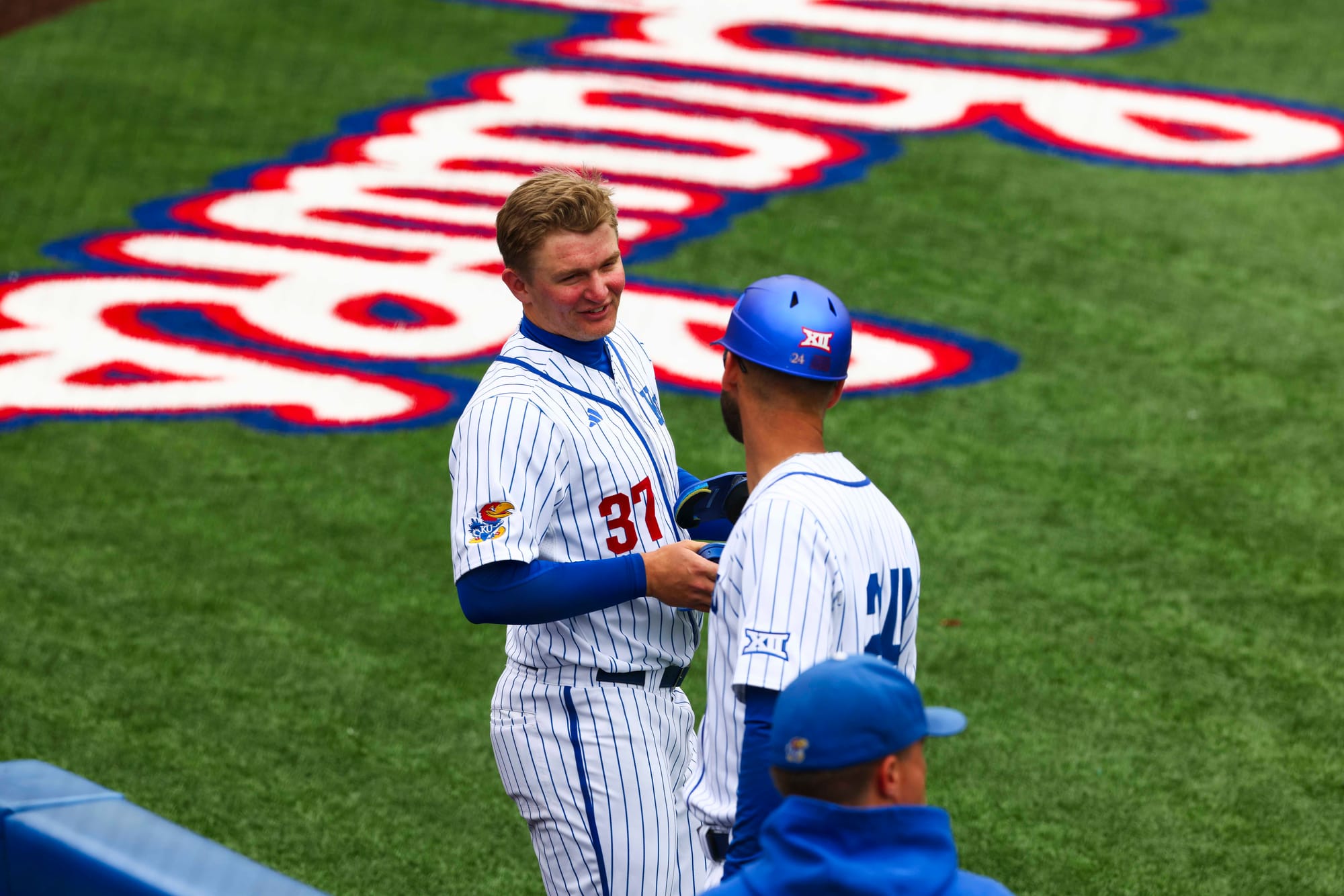
A tough decision made easy
With his symptoms lingering, Hauge knew it would be a challenge for him to get ready in time to head to Kansas for the 2024 season.
But he hadn’t ruled it out yet. This was what he had waited for and wanted his entire life. If he balked now, would the opportunity ever present itself again?
“It became very evident that he was trying to rush this to make it happen,” Fitzgerald told R1S1 Sports during a recent interview about Hauge’s journey to KU. “We finally just came to a spot of, ‘Hey, man, we’re trying to pound a square peg into a round hole now with the timing.’”
Both Hauge and KU’s coaching staff agreed. And each was brutally honest and transparent about their thinking while they tried to figure out how to move forward.
“We kind of looked at Jackson and thought he can help us for sure, but if he came to KU for the 2024 season then he wouldn’t get the full experience,” said Fitzgerald, lamenting that Hauge would've missed out on fall ball and things like shared suffering and bonding with teammates. “We also knew we could accomplish both the next year, with him at his best and fully healthy.”
Giving his guys the full Jayhawk experience — culture, resources, pride and baseball — is a critical part of what Fitzgerald has built in his three seasons at Kansas. And he says the culture piece of the KU program “far outweighs” anything his players do with a bat or a glove.
With that fact known and accepted by both sides, Fitzgerald put a bow on the discussions by giving Hauge what amounted to a pat on the butt as he headed off the proverbial field.
“Get healthy this spring, have a good summer and we’ll roll that straight into the fall and you’ll be ready to go the way you should,” he told him.
Hauge said the support he received from the KU coaches had a huge impact on his recovery. And his mindset.
“I wouldn’t have been ready," he said. "And I think it shows a lot about who they are as people and what the program stands for. I’m really blessed. I think 99% of programs in Division I probably would’ve been like, ‘Hey, man. Sorry. We’ll see.’ But the KU coaches were like, ‘Listen, it would be stupid of us and selfish of us to bring you down in the shape you’re in.’”
Said Kirkwold: “I think that reaffirmed his decision, one, that Kansas was the right place and these people actually cared about him, and, two, that this was all gonna be OK, no matter what happened.”
With that, the D-I dream was put on hold and Hauge was able to focus on his comeback with a clear mind.
Enter Kirkwold, who had known Hauge since he was 15 years old and coached him for three seasons with the Pitch to Pitch baseball club in Minnesota.
“He helped me immensely; he always does,” said Hauge of the man who has been as much a life coach as a baseball instructor to him. “He devised a plan for me that kind showed what the week-to-week would look like and then we got to work.”
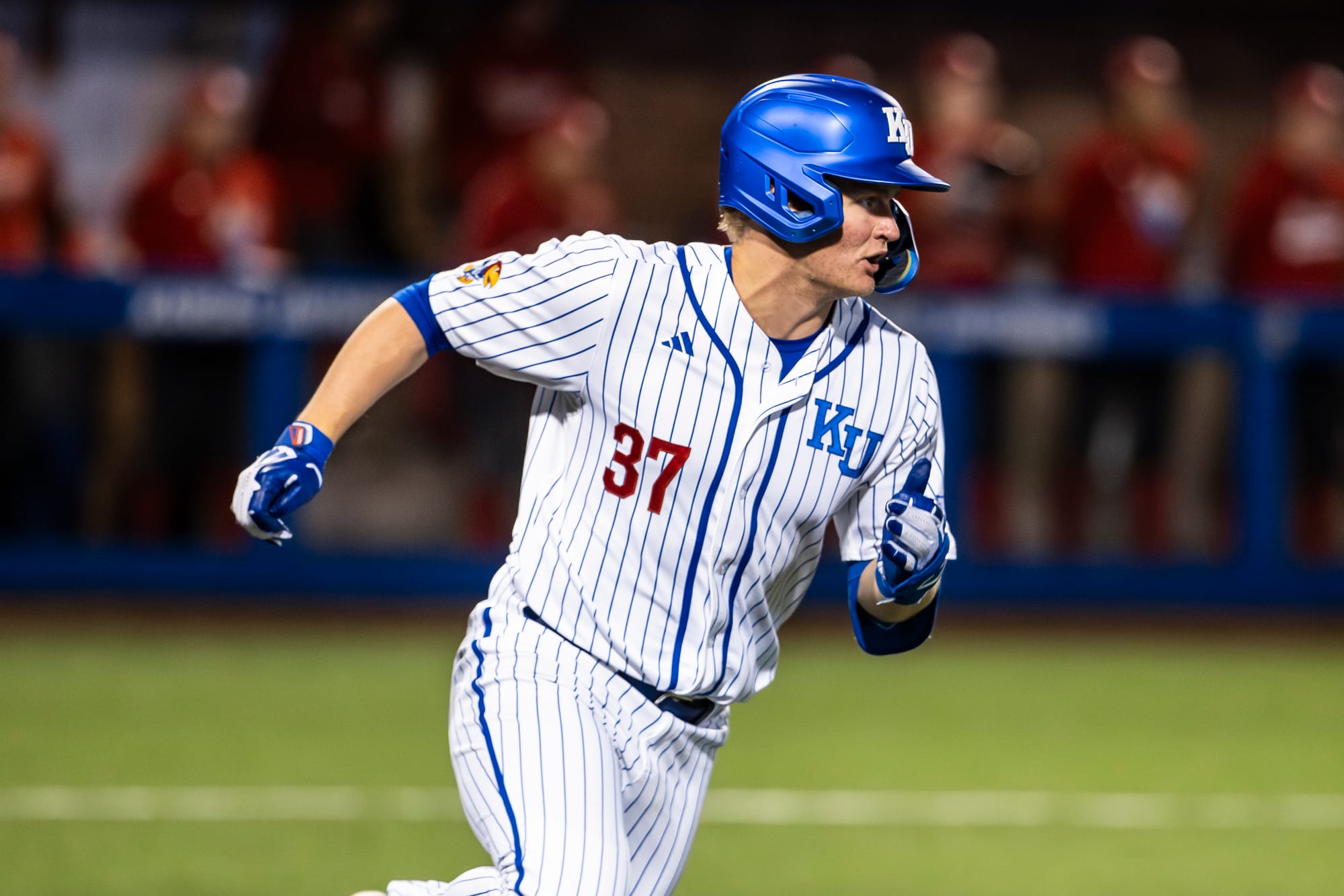
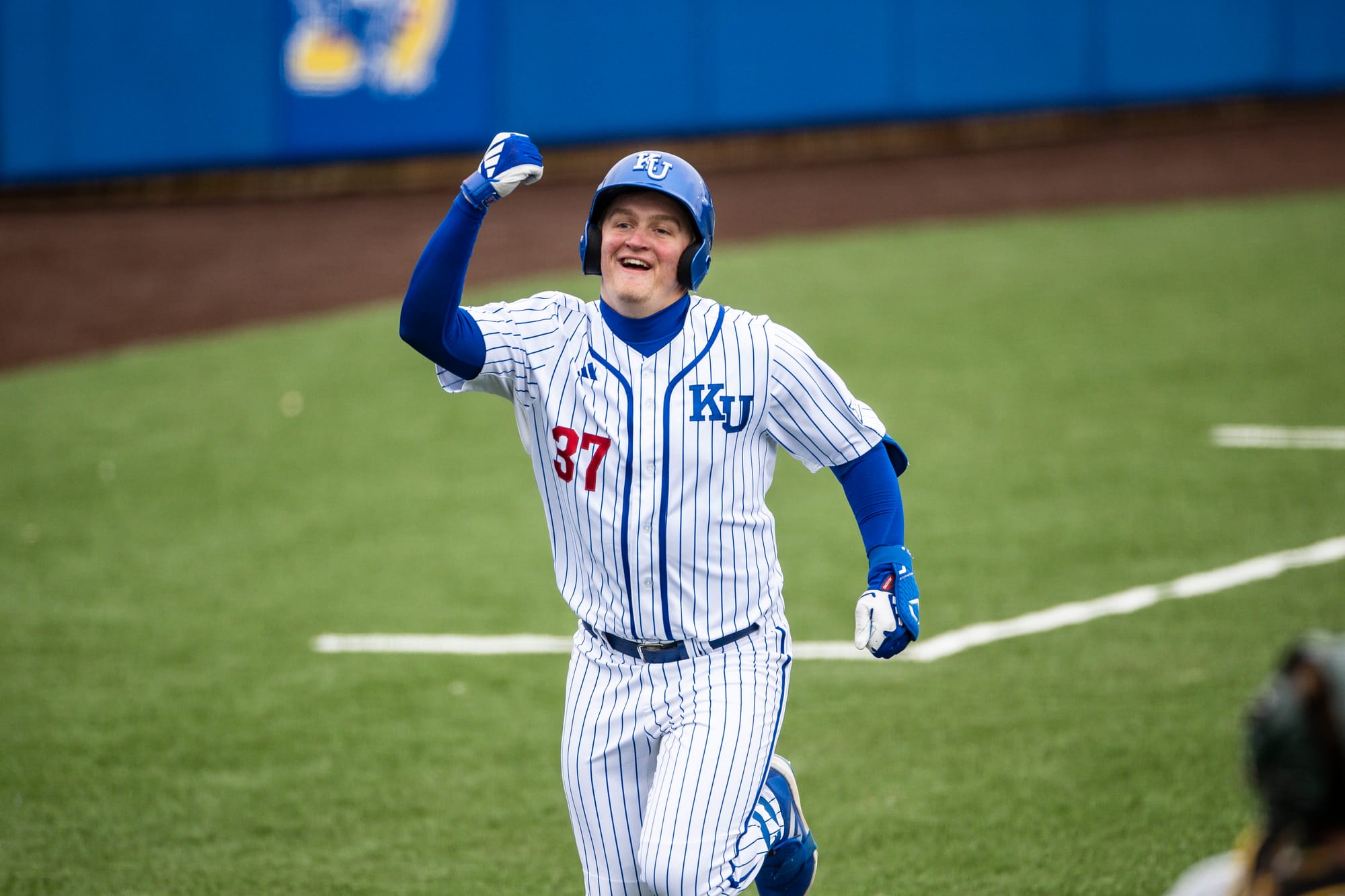
Kansas senior Jackson Hauge during recent game action at Hoglund Ballpark. [Kansas Athletics photos]
Finding his old form
Roughly six months after the collision, Hauge was finally cleared by doctors to return to his full workout routine. That was in March of 2024.
Kirkwold’s initial plan for getting Hauge to where he wanted to be had everything to do with mental healing and very little to do with actual baseball.
“In the very beginning it was a lot of conversations just about what a good day looked like,” Kirkwold told R1S1 Sports. “And some of that came down to the basics of how he can find some happiness.”
Hauge has been an open book about the mental health challenges he faced throughout this ordeal, and he has become a huge advocate for the importance of athletes being honest about how they’re feeling and what they’re facing.
Here was this physical specimen of a college athlete, who, just nine months earlier, was smashing the cover off of the ball with his summer team, preparing for the opportunity of a lifetime. And just like that, it all disappeared and left him dealing with the emotional toll of returning to the game that had been taken away from him. From that point on, in a very real sense, he was starting all the way over.
“From there, it was, ‘OK, let’s stack some good days and good weeks of weight room and sleep and food and those sorts of things, so we can get back into a good routine,’” Kirkwold recalled.
That approach was important because it kept Hauge in check.
The depth of their relationship allowed Kirkwold to embrace and understand the “huge mental burden” that the pressure of making the jump from DII to DI after such a serious injury created for Hauge.
“It’s a daunting task, right,” Hauge explained. “Holy crap. I just got kicked on my butt, I can’t work out, I can’t even look at a screen for too long; how am I gonna go play Division I college baseball?”
“I think, initially, he felt like he had to work on baseball sun-up to sundown, and that wasn’t going to be good for anybody,” Kirkwold added.
So, yeah, they did talk about how many ground balls Hauge needed to field, how many swings he should take in the cage and how long he should play catch each day. But just as much time was spent chipping away at the anxiety and finding a way to convince Hauge that he was enough and he was doing enough.
“Mentally, he had to feel good about what he was doing and also how he was doing,” Kirkwold said.
Added Hauge: “It was working smarter and not harder. Any time you're trying to come back from an injury, I think everybody thinks, ‘I need to be in the cage for like eight hours.’ And I thought that right away, too. But if you look at these professional hitters, the best hitters, they take their rounds with immense focus and diligence. It’s not about hitting 500 balls as far as you can. It’s about taking 20 swings and being on time for all 20 of those. So, I kind of shifted my mindset to that.”
There was more to the comeback than the philosophical and strategic side he mapped out with Kirkwold.
Hauge said one of his favorite parts of this chapter in his baseball career came when he spent several weeks training with a group of gray-haired, grown men who dutifully showed up every year to get back in shape for their annual baseball tournament.
“I was working out with this group of 50-to-60-year-old guys and they’re probably the funnest people to work out with ever,” Hauge recalled with a huge smile. “They were so down to earth and they’re there to have fun, and yet they were still trying to get better.”
One of them, Hauge said, had hip surgery one week and was back on the ballfield the next.
Their love of the game and the joy he saw it bring them was just what Hauge needed at that point in his life, as much to remind him of his own love for the game as to reiterate to him that he still had a chance.
“That was really well timed,” he said.
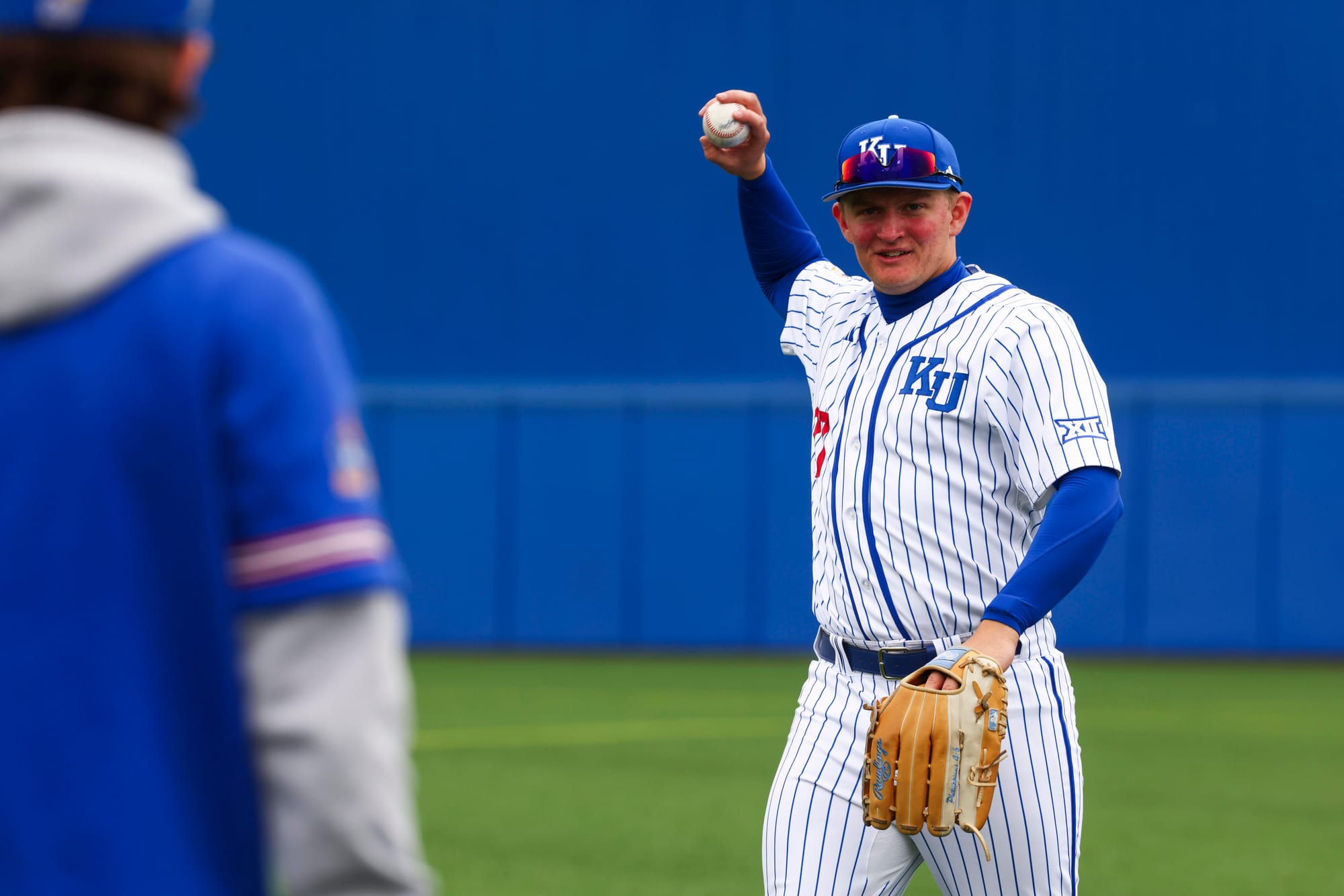
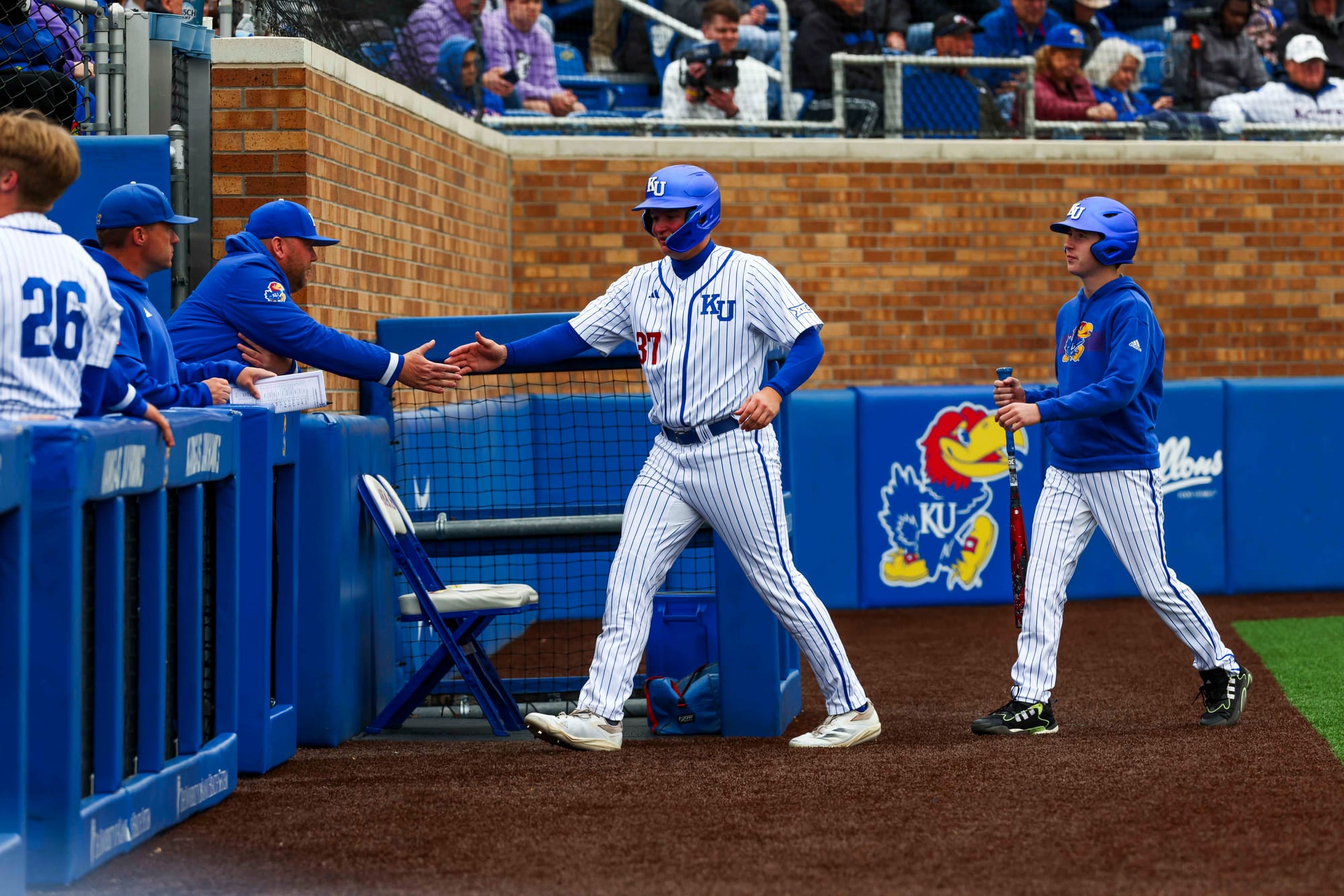
Jackson Hauge on the field (left) and after an at-bat (right) during a recent KU home game. [Chance Parker photos]
A classic late bloomer
Slowly but surely, Hauge started to return to form.
He took the spring of 2024 off of competitive baseball completely, but played that summer with the St. Cloud Rox, despite thinking he’d never be back there when his run ended in 2023. The thought one year earlier was that, by the time the summer of 2024 rolled around, he'd have finished his college career and moved on to whatever professional opportunities came his way.
But the injury left him looking for one last run with a summer team, and Hauge credits Rox manager Nick Studdard for welcoming him back with open arms.
That chance to return to familiar territory helped him as a baseball player as much as a man, and, before long, he was back to terrorizing opposing pitchers.
One thing that Kirkwold really stressed with Hauge during the early stages of his comeback was how they could spin what happened to him into an advantage.
He didn't always see it with crisp focus. But it did become clear to him from time to time.
One such time came during the summer of 2024, when Hauge felt fresher than ever. He was still fighting to get his timing back and battling with his approach at the plate, but his body felt good and his stats were solid, as well. The advantage, he realized, was that his time off helped save more than 100 games of wear and tear on his body.
That, he believed, would help him when he got to Kansas.
His coaches agreed.
At one point last summer, Fitzgerald went up to St. Cloud to watch a Rox game without telling any of the Jayhawks on the team that he would be there.
“I had seen their stats and had seen what they had done in college, but the eye test is still important to me,” said Fitzgerald, who was joined on the trip by other KU staff members. “There’s just something about watching guys compete.”
Hauge played right field that day and hit a home run in his first at-bat.
“We walked away going, ‘OK, Hauge’s a real guy,’” Fitzgerald recalled. “Real power, simple approach.”
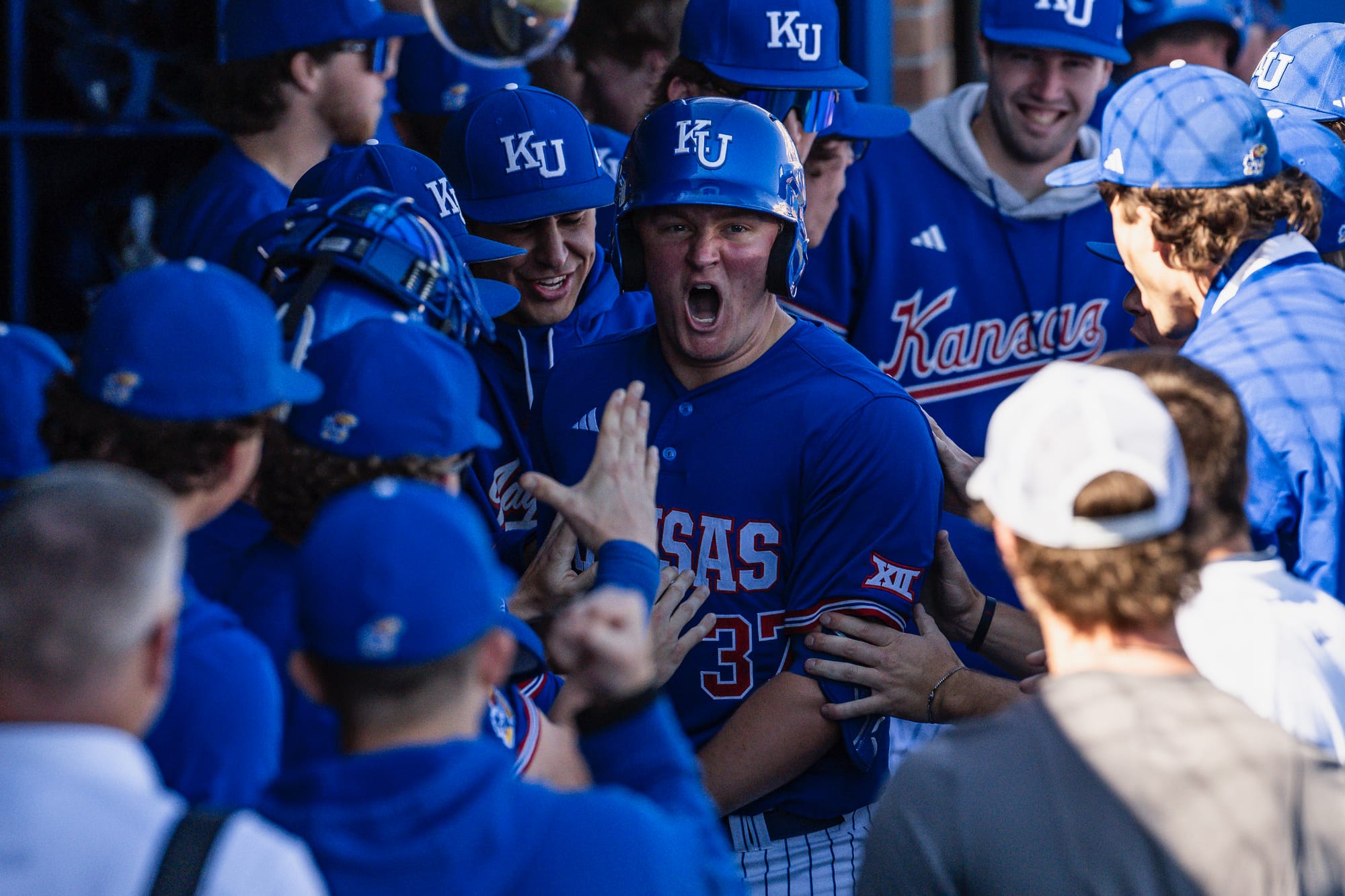
Simple at the plate, sure. But anything but simple when it came to the months of hard work he had logged to get back to that point.
Fitzgerald knew and understood that. Appreciated it even.
“The players’ journey is probably something I value more than I did before,” he said. “I’ve always cared about players and wanted them to have an incredible experience, but it’s so much more than just the baseball. The baseball is an incredible conduit and testing ground for what your life is gonna throw at you.”
None of it has been easy for Hauge. Even during his best days, the memories of his start in the game are never far from his mind.
A classic late-bloomer, who stood 5-foot-4, 130 pounds entering his sophomore year of high school and grew to be 5-10, 155 by the end of that year, Hauge didn’t play varsity until his junior year at Anoka High just north of Minneapolis.
He’s 6-1, 220 these days, but the slow blossoming never bothered him because, at that time, he was content to be around the game however he could.
In many ways, he still is. But he has bigger goals now.
There’s a story Hauge likes to tell, from his 9th-grade season, that involves his grandmother, “the most positive human being in my life.”
“I sat the bench,” he said. “Didn’t play. So, I always kept the (score) book. Before every game, my grandma would send me a text that said, “Hey Jackson, I’m so happy to see you play today. You’re gonna do the best book you can.”
The adversity didn’t end there.
During his first year at Minnesota State Mankato, he was forced to figure out how to adjust to college baseball amid the COVID pandemic.
In Year 2, he broke his hand after recording just four at-bats for the entire season. Worse yet, those at-bats cost him a year of eligibility.
On and on it went, with one setback after another. But because he had found a way to make it through one, he knew he could make it through them all.
It’s funny, but, nearly a decade ago, when he first met Hauge at age 15, long before any of the adversity hit, Kirkwold instantly saw something in Hauge that has helped him win all of his battles and continues to serve him well to this day.
“One of the beautiful things about Jackson, other than what he can do on the baseball field, is his amazing smile and energy,” Kirkwold said. “I came away from meeting him at that first tryout feeling like, ‘I’ve gotta have this guy on my team. I just want to hang out in the dugout with this kid.’”
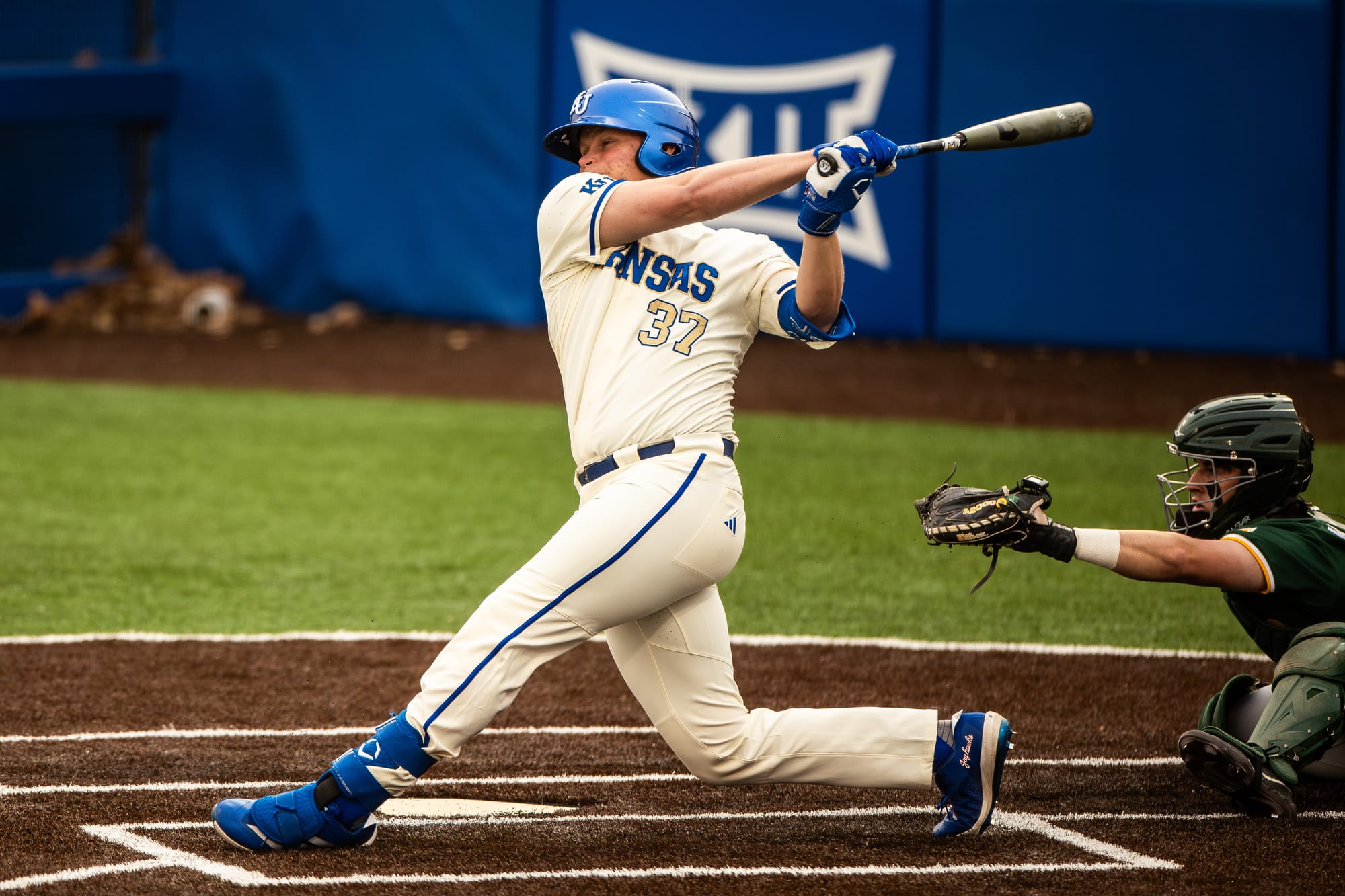
Making it count
Hauge’s journey — the ups and downs, big hits and tough blows, scary times and prevailing smiles — led him to Kansas, and boy is he taking advantage of it.
The stats are great. And he’s having a blast hitting the crap out of the ball.
But one of the best parts of the whole trek that put him here is that none of it left Hauge believing he’s special.
Lucky, sure. Reaping the benefits of hard work and dealing with some serious strain on the mind? Absolutely. But that’s something he shares with so many of his Kansas teammates. If you ask him, it’s a big part of why these Jayhawks are winning.
“I think if you look into the story of any one of our players, you’ll see adversity,” he said. “Our team is based off of a lot of guys that have battled throughout their career and they’ve struggled and they’ve found out how to have success. They are who they are because of what they’ve gone through.”
Because the 2025 KU roster is full of guys who have been through it in one way or another, Fitzgerald tips his cap to the KU athletic department and to KU Athletic Director Travis Goff for making sure all KU athletes understand that they have somewhere to turn if they need it.
“This has been going on since the beginning of time,” Fitzgerald said of college coaches helping guide players through their mental health journey as much as through rehab following an injury. “I think what’s different now is we’re actually talking about it. We have every resource you could possibly have for these guys, which is just great. When I look at Jackson, I think he’s doing exactly what we knew he could do, and it’s really satisfying to see him enjoying it.”
Kirkwold, who still keeps in regular contact with Hauge, feels the same way.
Just last week, after a 4-for-6 showing at the plate in a win over Wichita State, Hauge sent Kirkwold the specific exit velocities on all of the balls he hit that day. And all Kirkwold could do was smile.
The numbers brought to mind rockets racing through space but also made him reflect on where Hauge was a year ago and all of the hard work, all of the fears and doubts, all of the setbacks and all of the victories, big and small, along the way.
Kirkwold can’t help but laugh with amazement when he talks about how Lawrence-based restaurant 23rd Street Brewery named a sandwich on its menu after Hauge — Hauge’s Hoagie, a turkey sandwich on a butter-toasted hoagie bun with bacon, lettuce, tomato, cheddar cheese, banana peppers and balsamic vinaigrette.
“When we talk these days, it’s largely about happiness, food, sleep and are we catching barrels,’” Kirkwold said. “Happiness and barrels, do they kind of go together? A little bit, when you’re catching as many as he is.”
When you watch him play, it’s easy to see that the joy has returned to Hauge’s game. His eyes are bright, he looks to be at peace and he’s clearly having more fun on the baseball field than at any time in his life.
Even his KU chapter has had hard days. Fall ball was tough, and there were plenty of days when he was still fighting to shake off some of the rust while facing the type of talent that he had never quite seen before.
“A little of bit of me was like, ‘Holy crap, I’ve worked really hard for this, and I had to look in the mirror a lot and say, ‘Can I do this?’ ‘Is this too much?’ ‘Am I enough?’” Hauge recalled of his early days as a Jayhawk.
“But you’re always enough,” he added. “Even if I came here and didn’t perform, I never would've regretted it. I would've kicked myself more if I never got to see it through than I would if I worked my butt off and put in all the work I could and just fell short.”
“Everybody goes through stuff, and you kind of wonder what it’s gonna look like for you. It was rough for me, but I’m here now. And I’m really trying to just stay in the moment. I’m gonna try to enjoy this, prepare for tomorrow, be on time, hear (KU recruiting coordinator) Jon Coyne’s history fact of the day, enjoy my teammates to the fullest and do whatever the day demands.”

— For tickets to all KU athletic events, visit kuathletics.com

